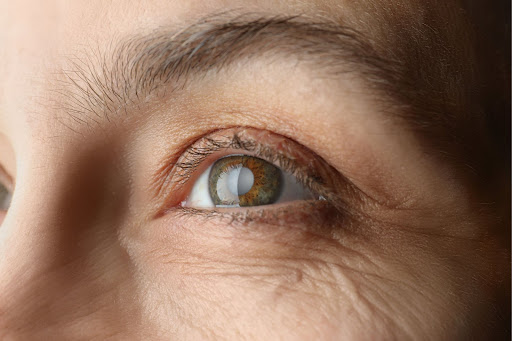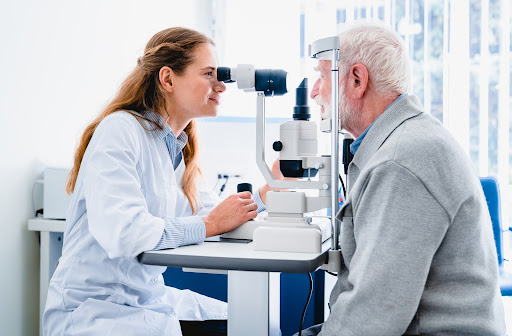Cataracts often come with little to no symptoms in their early stages. So, how can preventative eye care keep us ahead of potential eye problems? There are several ways that your optometrist can test your eyes for cataracts.
Typically, a comprehensive eye exam includes testing for cataracts and other potential issues with your eyes. Receiving eye exams at the recommended times throughout your life is the best way for the early diagnosis and treatment of most eye conditions.
What Is a Cataract?
Cataracts are most commonly an age-related eye condition. However on rare occasions, even babies can get them. In a typical case, our eye’s natural lens begins to grow cloudy as we age. Although it sounds a bit unsettling, cataracts don’t cause any discomfort. If they aren’t severe, you likely won’t notice any symptoms.
Usually cataract surgery isn’t necessary until the cataract is causing you issues in your day-to-day life or when glasses cannot correct your vision.
Symptoms of a Cataract
Suppose you are going to the eye doctor regularly. In that case, they will likely catch a cataract before you notice any symptoms at all. However, there are some potential symptoms to be mindful of:
- Loss of or decreased night vision
- Light and glare sensitivities
- Cloudy or blurry vision
- Needing brighter light than usual for reading and similar activities
- Frequently requiring new lens prescriptions
- Eye color fading or yellowing
- Double vision in one eye
If you begin experiencing any of these symptoms—especially multiple ones—it’s a good idea to schedule an eye exam. These are common symptoms of cataracts, but other eye conditions can share some of these symptoms.

Can an Eye Exam Detect Cataracts?
A comprehensive eye exam is the best way to detect cataracts early. There are several other ways to find cataracts, but the value of an eye exam is all-encompassing.
When your optometrist performs a comprehensive eye exam, they will ask you detailed questions about your medical and personal history. This, in conjunction with several tests during the exam, provides the doctor with a full picture of your eye health. Then they can give you the best and most accurate advice.
When to Get Tested for Cataracts
If you’re not already following the recommended schedule for eye exams for your age, there are several instances where you would want your eyes tested for cataracts.
- At 55 years old and over, your risk for cataracts increases.
- Diabetes and a family history of cataracts are both risk factors.
- Eye injuries can increase your risk of cataracts.
- Eye disease and certain medicines like steroids can cause cataracts to develop.
Preventing Cataracts
There are no studies demonstrating how we can completely prevent or slow cataracts. Still, many doctors agree that certain lifestyle choices contribute to healthy eyes.
- Eye Exams: Getting the recommended eye exams is an excellent way to get an early diagnosis and treatment of most eye conditions
- Smoking and Excessive Alcohol Consumption: These habits can contribute to eye problems like cataracts.
- Healthy Diet: There is no concrete evidence that antioxidants will prevent cataracts. However, numerous studies show that a diet rich in vitamins and minerals from fruits and vegetables is a great step toward healthy eyes.
- Protection from the Sun: Wearing sunglasses to protect your eyes from the sun’s ultraviolet radiation is important for preserving your eye health.
Treating a Cataract
A new prescription for your glasses or brighter lights when reading are two viable treatments in the early stages of a cataract. If for some reason it doesn’t progress further, that may be all you need.
However, once a cataract begins to affect your daily life, cataract surgery is the only fix. Don’t let the word surgery scare you. A highly trained ophthalmologist performs cataract surgery and it is a relatively quick, outpatient procedure. In fact, in most cases, you won’t need more than a local anesthetic in your eye for the procedure.
After cataract surgery, most people are back to their normal activities within a few weeks. How quickly the eye recovers is dependent on each individual person. Your eye doctor can give you personalized information concerning any risk factors you may have.
Closing Thoughts on Detecting Cataracts
Cataracts are a normal part of the aging process. If you think you may have some symptoms or want more information, contact our office today. The helpful staff at Center For Sight are available to book your appointment or answer your questions.







